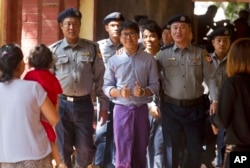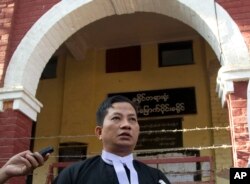As the trial of two Myanmar journalists who work for Reuters entered its third hearing on Feb. 1, holes in the government’s case presented easy pickings for a dedicated duo of defense lawyers, who cross-examined a second police witness over five hours.
Yet the fate of local reporters Wa Lone and Kyaw Soe Oo remains in the hands of an unreformed judiciary that critics say is vulnerable to government pressure. Both face a possible 14-year prison sentence, and as expected, the judge denied their bail request on Feb. 1.
The two are being tried under the Official Secrets Act—a British colonial-era, counter-espionage law—for their investigative work with Reuters, the international news wire, on military operations in Rakhine State. Following militant attacks in August, the crackdown has driven close to 700,000 Rohingya Muslims into Bangladesh.
The reporters told their families they were arrested on Dec. 12 in Yangon right after meeting police for dinner, where the officers, whom they hadn’t met before, handed them documents allegedly detailing security deployments in Rakhine. Soon afterwards, ruling party figure Win Htein told the press the reporters had likely been “caught in a trap.”
The civilian government, led by Aung San Suu Kyi’s National League for Democracy (NLD), could in principle drop the case tomorrow, via its control of the attorney general’s office, which handles criminal prosecutions, and the pardoning powers of the President.
But her administration has withstood a sustained diplomatic and media campaign and explosive criticism from U.S. diplomat Bill Richardson.
Inconsistencies
During the Feb. 1 session, police witness Major Min Thant, who claims to have commanded the team that arrested the reporters in Yangon’s northern Mingalardon Township, was unable or refused to answer many of the questions from defense lawyer Than Zaw Aung. When he did respond, inconsistencies emerged.
The police major —who professed not to have known about the reporters’ dinner with police— told the court the reporters had been arrested at a major road junction, where police in uniform had set up a checkpoint. However, the case file recorded it elsewhere. The major explained that Kyaw Oo Soe had refused to sign a police report till the recorded location of arrest was changed to outside the restaurant they had come from.
After the hearing, Wa Lone and Kyaw Soe Oo told reporters that plainclothes officers arrested them right outside the restaurant—not at a road junction checkpoint, which, according to police major's description, was located in the opposite direction to their way home. They also claimed not to recognize Min Thant.
Min Thant submitted the four documents allegedly found on Wa Lone and Kyaw Soe Oo to the court. These contained information on police resources in northern Rakhine, the details of a Rohingya militant attack on a police base, and a report on the state of villages subject to the army and police crackdown.
In response, the defense lawyer handed over old copies of Kyemon, a government-run newspaper, to the judge, to illustrate that the contents of the purportedly secret documents were already on public record.
During breaks in the courtroom, Wa Lone and Kyaw Soe were able to interact with their families, friends, and reporters. Wa Lone told VOA he was “trying to be optimistic” about the case. “We didn’t do anything wrong. We shouldn’t be here,” he said.
In the last court session, on Jan. 23, the defense drew attention to the unlikely speed with which the police sought and obtained authorization from the President’s Office to investigate the reporters, as required by the law.
According to the testimony of Lieutenant-Colonel Yu Naing, police commander of Yangon’s northern district, the permission letter citing the 1923 Official Secrets Act was prepared by 10 pm, within an hour of their arrest.
Permission was granted the next day. The President Htin Kyaw—an Aung San Suu Kyi ally drawn from the NLD—had just left for Japan to attend a health forum, allowing Myint Swe, the former army general appointed as Vice President by the military, to authorize the investigation.
The other defense lawyer Khin Maung Zaw told VOA that the inadequate responses given during police testimony made him “hopeful,” since they expose the weakness of the government’s case.
Future witnesses
Wa Lone and Kyaw Soe are set to remain behind bars for many months before the judge decides their fate. Police officers Yu Naing and Min Thant, who occupied a full day each of court time, are the first out of 25 witnesses lined up by the government.
Defense lawyer Khin Maung Zaw told reporters on Jan. 23 that hearing all prosecution witnesses could take “three to four months,” after which the defense would present “10-15” witnesses of their own.
The names of two other police officers—whom the government has claimed are also being investigated under the Official Secrets Act for handing the reporters the secret documents—were found on the prosecution witness list. The defense lawyers asked the court about their case but the judge and prosecutors claimed not to know.
Meanwhile, international pressure continues to mount on the case, underlining growing concern over Myanmar’s illiberal turn after years of relative freedom since reforms began in 2011.
A Feb. 1 statement from Stephen J. Adler, Reuters president and editor-in-chief, called for the reporters’ “prompt release,” adding, “We believe the court proceedings will demonstrate their innocence.”
The Danish Embassy in Myanmar on Thursday cited “inconsistencies in the material put before the court” on the earlier session and called for the “immediate release of the two journalists.” The Norwegian Embassy backed that call Friday, adding this “is just one of several cases in Myanmar where journalists are on trial for doing their job.”
In New York, a spokesperson for U.N. Secretary-General António Guterres said he is watching the case closely. “The Secretary-General has expressed his concern at the erosion of the press freedom in Myanmar and he has called for the international community to do whatever it can to secure the release of the journalists and to ensure press freedom in the country,” spokesperson Stephane Dujarric said.






